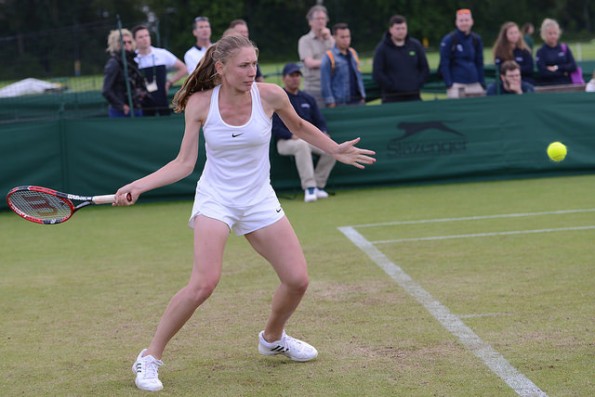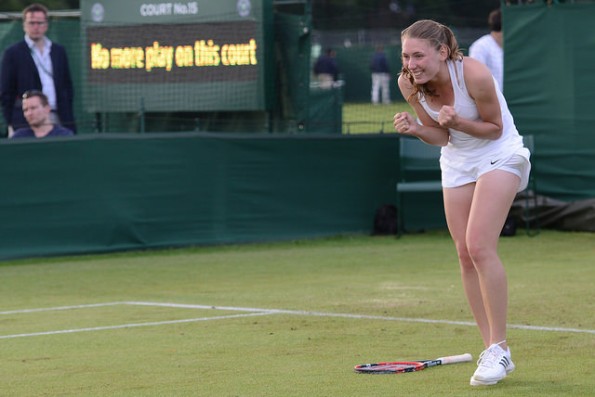Road from Roehampton: Qualifying Wraps at Wimbledon

Ekaterina Alexandrova. Photo: Christopher Levy
Sometimes the best stories of a Grand Slam tournament come before the tournament. Sixteen men and 12 women booked their places in the main draw of the 2016 Wimbledon Championships with successful qualifying campaigns at Roehampton. These are their stories, from court-side.
by Alex Macpherson
The marathon woman
For Ekaterina Alexandrova, calling this week unexpected would be an understatement.
The 21-year-old Russian World No. 213 didn’t expect to be in the Wimbledon qualifying draw at all: she was 10 spots out of the original cutoff and only a last-minute withdrawal by Spain’s María Teresa Torró Flor sealed her place in her first ever Grand Slam competition. In the event, she was the second last player accepted by ranking.
Alexandrova, a clean ball-striker with a wonderfully smooth backhand and a useful serve, had never played on grass before; indeed, last week she’d opted for a clay ITF event in Szeged, Hungary — where she made the quarterfinals — over the grass warmups. Nor had she ever played a match that had gone into overtime beyond the usual final set tiebreak.
Both those things changed dramatically on the Roehampton lawns.
It began with a straightforward 6-3, 6-3 upset of the 2011 Roland Garros girls’ champion, Tunisia’s Ons Jabeur.
Then, it took a turn for the remarkable: an epic 6-4, 4-6, 14-12 victory over Liechtenstein’s Stephanie Vogt on the far-flung Court 12, followed two days later by a dramatic early-evening 2-6, 7-5, 13-11 battle against teenage British wildcard Harriet Dart. After over six and a half hours of total match play, Alexandrova makes her first-ever Grand Slam main draw at the first time of asking.
She’d had to serve for the match three times against Dart, but when Alexandrova sealed it with an ace, she still had the energy to leap into the air with a shriek of delight.

Photo: Christopher Levy
Afterwards, she joked that the match had been easier than the previous one.
“It’s less by two games!” she exclaimed. “That [vs. Vogt] was the first time I’d played so long — normally, I finish at 7-6.”
It’s been a surreal week for Alexandrova, who boarded a flight to London without knowing whether she’d get to play.
“I was first in the alternates [when I left], and when I arrived at Heathrow, I checked straight away – and I was in, I was so happy. I always wanted to play Grand Slams — Wimbledon, it’s my dream.”

Kumkhum coming for your faves
One of the most impressive players in the women’s qualifying draw was Luksika Kumkhum. The 22-year-old Thai first seized the world’s attention with her stunning upset of Petra Kvitova at the 2014 Australian Open but had struggled to recapture that form since, with her ranking falling to No. 170.
In the week that Thai legend Tamarine Tanasugarn formally announced her retirement, Kumkhum seemed ready to inherit her grass court mantle.
Kumkhum’s blistering, hyper-aggressive groundstrokes enabled her to overpower No. 15 seed Silvia Soler-Espinosa 6-1, 7-6(6), Australian comeback kid Ashleigh Barty 3-6, 6-4, 6-2 and former Wimbledon doubles champion Vania King 7-6(4), 6-4.
Those shots seem tailor-made for grass, but Kumkhum hasn’t always been comfortable on the surface. Towards the end of her win over Soler-Espinosa, this showed: the Spaniard dug deep to retrieve a 1-4 second set deficit and hold a set point in the tiebreak as Kumkhum’s putative winners started to misfire.
Afterwards, Kumkhum said she was thinking, “Okay, just put it in, just put it in keep confident, don’t lose yourself.”
As for her grass proficiency, she’s still unsure, but is ready to make some concessions.
“First year — first one or two years, I didn’t look good on grass. Fourth year, I’m getting a little better.”
Global reach
In a week of depressingly xenophobic political upheaval in the United Kingdom, the diversity and sheer global reach of tennis has been a comfort in attending this year’s qualifying. Darian King is the first Bajan man to compete at Wimbledon, and his first match was fittingly memorable: a battling 1-6, 6-4, 10-8 win over Taiwan’s Chen Ti in which King’s speed and touch were both on prominent display.
“From a small country, only 160 square miles — to represent Barbados is a big deal,” he said afterwards. “It’s the first time since juniors I’m back here for the tradition of the sport. I’m pretty glad I got a chance to play here.”
Like Alexandrova, this was King’s first ever overtime match.
“You could see at 6-6, I was looking for a tiebreaker!” he laughed.
Notes and miscellany
Tuesday was a disastrous day for the much touted squad of talented American teenagers. 18-year-olds Stefan Kozlov and Frances Tiafoe fell simultaneously and without garnering even a set between them in the first round: Kozlov seemed powerless against the raking winners from Russia’s Daniil Medvedev, while an ill-tempered Tiafoe failed to get to grips with the canny placement and net-rushing of 33-year-old David Guez.
“It doesn’t get much better,” Tiafoe moaned sarcastically after being broken for the final time in the match — not with an attitude like that it won’t, one might’ve thought.
Later in the day, it was less of a shock that clay-loving 19-year-old Tommy Paul, who had opted to play clay Challengers over grass warmups, fell to the serve-and-volleying panache of British wildcard Edward Corrie, 6-3, 1-6, 7-5.

Fratangelo and Harrison at the net. Photo: Christopher Levy
Tiafoe may have exhibited some temper, but one of the most prolonged cases of grumpiness came from the former American Next Big Thing, Ryan Harrison. Against No. 6 seed and compatriot Bjorn Fratangelo, Harrison was down a set but receiving at 3-2, deuce when he slammed a forehand into one corner before putting away the ensuing sitter emphatically.
Fratangelo, though, protested that the linesman had called the previous shot out. This hadn’t been the case, but the linesman admitted to making a sound and the umpire ruled a replay due to this hindrance. Harrison’s protestations that Fratangelo had waited an extra shot to make his case fell on deaf ears.
“Shout out to your character,” he called across the net.
Throughout the rest of the set at every changeover, Harrison continued to argue much of which seemed to be playing up to a vocal and sympathetic section of the crowd behind his chair.

Ryan Harrison. Photo: Christopher Levy
“I’ve got crowd support because of everything you’re doing to me,” complained Harrison, who also brought up an earlier code violation for a smashed racket.
“I’ve got sympathy for you, too,” sighed the exasperated umpire.
It was little surprise to anyone present that Fratangelo ultimately proved mentally stronger, with Harrison flopping three second serve returns in the final game to send the sixth seed through.
The final first round match to be completed was one of the most dramatic, as Japanese 10th seed Risa Ozaki saved three match points against 18-year-old British wildcard Freya Christie for a 67(7) 76(4) 75 win. Ozaki exhibited some of the most impressive defensive skills of the event, seemingly able to run down and redirect everything Christie threw at her.
After an epic hold for 5-3 in the final set, Christie clutched her back; after missing a match point in the following game, she cried, “Why now?”

Freya Christie. Photo: Christopher Levy
Two more match points came and went as she served for it, the first of which ended after Ozaki’s tireless retrieving goaded Christie into putting a backhand wide after a marathon rally. The teenager called for a medical timeout after falling behind 5-6, but to no avail; barely able to serve or hit backhands, the final game was a sad anticlimax. Christie was in tears before she got to the net for the handshake and only managed to limp a few meters from the court before collapsing, where she was treated for a further 20 minutes.
It might have been scant comfort to her that she had visibly worn Ozaki down for her friend and compatriot Dart to dispatch in straight sets a few hours later.
Alex Macpherson is a London-based freelance journalist. You can follow him on Twitter @alex_macpherson.

Leave a comment